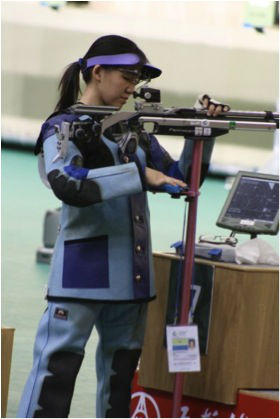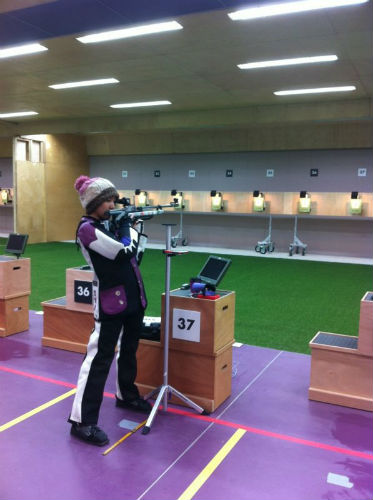Her pet event will not be available at the SEA Games in Myanmar next month. But that does not worry our shooting sensation Jasmine Ser – Singapore’s 2011 Sportswoman of the Year. She is still aiming for a gold medal – and is up for the challenge.
I recently caught up with this 23-year-old sharp shooter, a gold medallist at the 2010 Commonwealth Games and spoke to Jasmine about her prospects for the SEA Games and how she is preparing for the Rio 2016 Olympics. One of the inaugural winners for the Sports Excellence Scholarship (SPEX Scholarship), Jasmine also gave tips to aspiring shooters.
To find out what this talented NUS Business student has to say, do read on – for my interview with her.
Jasmine, how do you think you’ll do in the South East Asia (SEA) Games next month in Myanmar?
Sadly, there will only be one event, the 50m Prone, for all rifle events and as this is not an Olympic event, I did not put much emphasis on it in previous years. But I am aiming for the gold medal although it is going to be a tough competition. I have been preparing for it from the start of this year, and I am looking forward to the competition!
What are your favourite shooting events?
My pet events are the 10M air rifle, and 50M 3-Position women events.
How have you been doing in your pet events in 2013?
My last major overseas competitions were the World Cup in Granada, Spain – and the World University Games 2013 in Kazan, Russia. I entered the finals in the 50M 3-Position event for both competitions and came in 7th place in Granada, and 8th in Kazan.
It was a great start for me as I was still studying – and had lesser time to train in recent months.
How is your training progressing for the 2016 Rio Olympics?
My training is progressing well and I am taking one step at a time to improve my skills for future competitions. I should be competing more often next year, as part of my plan and all should be well.
What made you initially take up shooting?
I joined the shooting club in my Alma mater, Ahmad Ibrahim Secondary School at 13 years old. Back then I felt that this sport was interesting and unique – different from other usual sports clubs. My sister was also in the same club, and she was winning competitions and bringing back the medals to show me, so I thought maybe I can do it too.
What is a typical training day for you like? And how many hours a day do you train?
I will reach the National Shooting Centre at 10am, and start training for the 50m rifle 3-position, before 11am. It will last till 1.30 pm with breaks in between, followed by lunch. The second session for the day will be at a different venue, the Safra Yishun Country Club, for another event – the 10m Air Rifle. This usually ends before 6pm.
The total training time for each day would be about five to six hours, with the rest of the time being spent preparing and setting up equipment, travelling and resting.
Do you follow any special dietary requirements? What are your meals like?
I do not have special diets, but I won’t take spicy foods and I will take light meals before my competitions.
What are the biggest challenges that you face in your sport?
Adapting to the change in rules. After the London Olympics, the International Shooting Federation changed the final rules for most if not all, shooting events. This includes both of my Olympic events.
The final rounds used to comprise of 10 shots, in which the score in the final would be combined with the qualification score, to see who has the highest. This means that if I had shot well in the qualification round, I will have a slight advantage over others.
However the new rule states that no qualification score will be carried forward to the final round, which now has a 100% weightage on the final position. Also, because of this rule, they increased the number of shots in the finals, and for the 3-Position event, I have to fire a total of 45 shots now compared to 10 shots previously. The whole game becomes more exciting and I have to adapt this change and get the hang of it.
What is your social life like?
I meet up with friends whenever I have time. Mostly we meet for birthday celebrations. My time is spent on managing my studies and sport.
What shooting events do you enjoy watching yourself?
I enjoy watching the finals for all shooting events because during the final rounds, we are allowed to cheer and clap, and there’s much excitement and anticipation to know who is going to win.
Why do you think more people are not taking up shooting in Singapore?
Firstly, the shooting sport is not offered in all schools, so most students are not aware of it. But this scene is changing as there are now junior programmes conducted by the Ministry of Education (MOE) to encourage young kids at primary school level to have the chance to try the sport.
Secondly, as this sport is not an action-packed sport it is less interesting for the public, compared to say, swimming.
How would you advise someone who is interested to pick up the sport?
Get a coach if he or she wants to see improvements because it is difficult to learn the technique skills without one. If not, the person can also search shooting websites and forums for opinions on the techniques and learn something from there. Have patience .
More interviews with Singapore’s best athletes
- Swimmer Joseph Schooling
- Distance Runner Mok Ying Ren
- Distance Runner Ashley Liew
- Ultra Marathon Runner Wong Hoong Wei



Leave a Comment